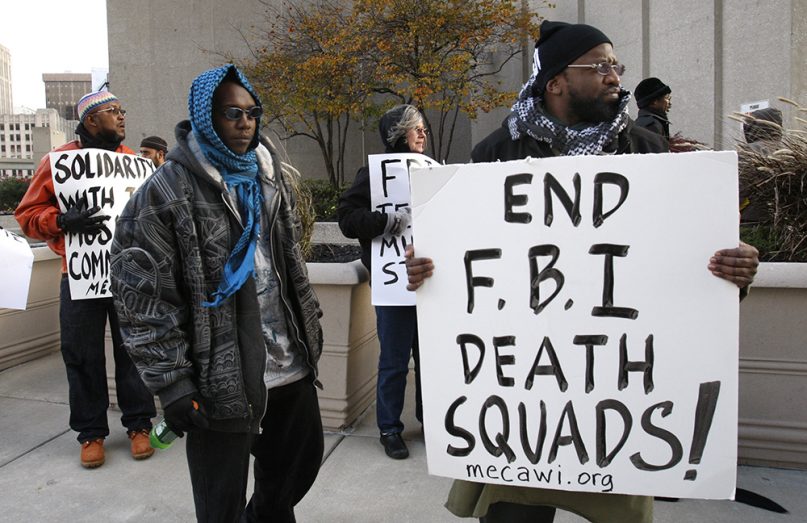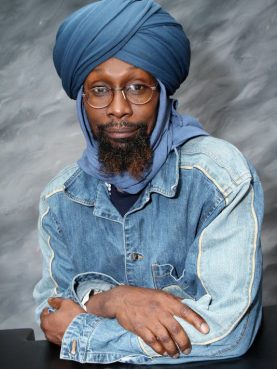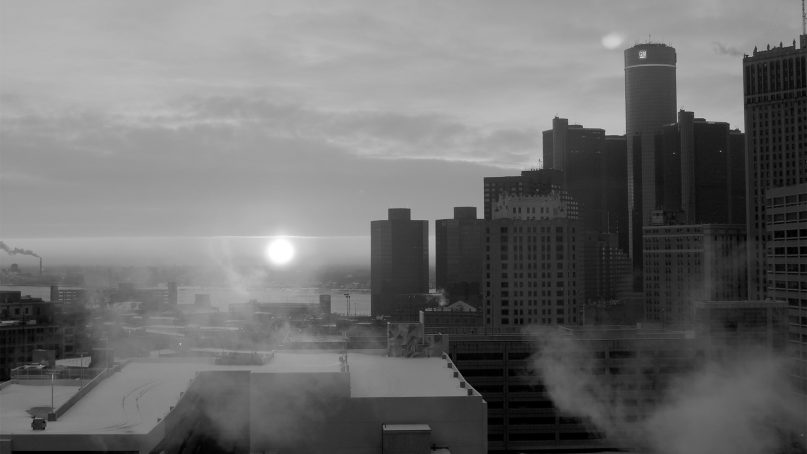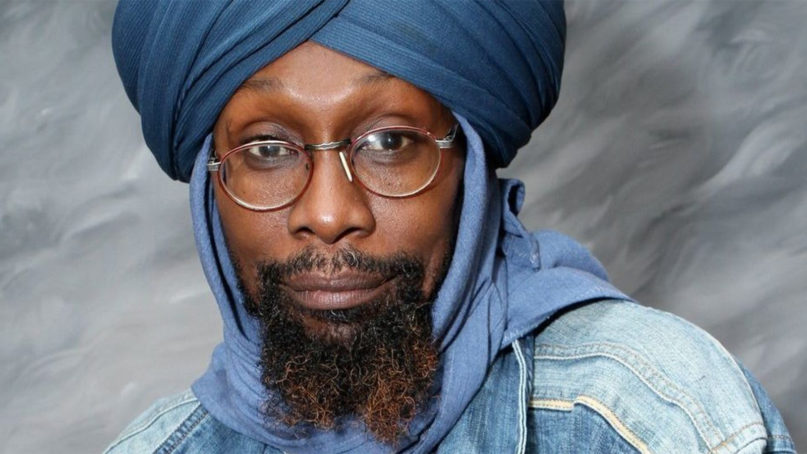
In this Nov. 5, 2009, file photo, Akil Fahd, right, protests with others outside the McNamara Federal Building in Detroit. The protesters wanted an independent investigation into the death of Luqman Ameen Abdullah, a Detroit imam killed in a shootout with federal agents. (AP Photo/Carlos Osorio, File)
(RNS) — A decade after federal agents shot and killed a leading Detroit-area imam, Muslims in Michigan and around the country say they still have more questions than answers about the influential community leader’s death.
Imam Luqman Ameen Abdullah led Masjid Al-Haqq in Detroit’s West Side until he was killed in a 2009 warehouse raid. Supporters say he may have been the first imam, and perhaps even the first mainstream faith leader, killed in the U.S. by federal authorities.
“This event really changed all of our lives in a second,” Abdullah’s daughter, 45-year-old Qiyamah Regan, said Saturday (Oct. 26) at a community discussion remembering the imam’s killing. “The way that it happened … we feel he was unjustly killed. Still living here in Michigan, I know I’ve been uncomfortable because of law enforcement and not feeling safe and secure.”

This undated photo provided by Muslim Alliance of North America shows Imam Luqman Ameen Abdullah, imam of the Masjid Al-Haqq mosque in Detroit. The FBI says Luqman Ameen Abdullah was fatally shot Wed., Oct. 28, 2009, after resisting arrest and firing at agents at a warehouse in Dearborn, Michigan. (Photo by Ron Foster Sharif)
Detroit Muslim and Christian leaders and other activists participated in the discussion hosted by the Council on American-Islamic Relations-Michigan at Detroit’s Muslim Center mosque, remembering Abdullah’s decades of work organizing a weekly soup kitchen and helping ex-offenders reenter society.
“It’s probably the most heartbreaking case that I ever will work on in my career,” said attorney Lena Masri, who joined CAIR as its national litigation director attorney the day Abdullah died and who later filed a lawsuit against the FBI over Abdullah’s shooting. “The vast majority of issues that are underlying this case, most people don’t know about, because of a concerted effort by the government to cover up what actually happened that day.”
The lawsuit, which claimed wrongful death and fraud, was dismissed in federal court in 2015. The Supreme Court did not grant the plaintiffs’ request to review the case.
The statute of limitations has since run out for the lawsuit, CAIR officials noted. Still, they continue to demand the names of the four FBI agents who shot at Abdullah, calling it a systematic “suppression of evidence.”
“We want to know. What was their record? Why did they conceal the names of those people?” said Dawud Walid, executive director of CAIR-MI, who knew Abdullah for many years. “The government … would not divulge the names of the tactical team that flew in here and then flew out, and supposedly left town with the gun that Imam Luqman allegedly had, that no one else from law enforcement saw except for the actual people who shot him.”
On Oct. 28, 2009, dozens of FBI agents swarmed a Dearborn, Michigan, warehouse to execute an arrest warrant against Abdullah and other men for charges including conspiracy to sell stolen goods transported in interstate commerce, illegal possession of firearms and alterations to a vehicle identification number.
Abdullah was mauled by a police dog, shot more than 20 times and died at the scene. In a statement that day, the FBI claimed that Abdullah “did not surrender and fired his weapon. An exchange of gun fire followed” – during which, according to the report, Abdullah shot the K9 dog — “and Abdullah was killed.”
Investigations by the Michigan attorney general and the U.S. Department of Justice’s Civil Rights Division afterward found the shooting justified.
The FBI statement, as well as a 45-page criminal affidavit, described Abdullah as the head of a “radical, fundamentalist” African American Muslim group seeking to “establish a separate Sharia-law governed state within the United States.”

A snowy morning in downtown Detroit. Photo courtesy of Creative Commons
Authorities had been surveilling him for years, including a two-year undercover investigation infiltrating his mosque.
Though the FBI’s counterterrorism squad and the multiagency Joint Terrorism Task Force were involved, and Abdullah had been added to the federal terror watchlist, no terrorism charges were brought.
Abdullah was not an uncontroversial figure among American Muslim communities, due in part to his forthright criticism of the government. But he has seen widespread support from interfaith, civil rights and community activists. An estimated 1,500 people attended the four-mile procession to his funeral.
From the start, Abdullah’s family and lawyers have contested the FBI’s version of events, with many alleging a government conspiracy and cover-up.
They point to an account by an eyewitness who said Abdullah was unarmed and lying prone when he was shot; claim that the caliber of the bullets that entered the dog did not match that of Abdullah’s weapon but matched the FBI agents’ M4 rifles; question the presence of three federal informants in the warehouse at the time of Abdullah’s death; and note that Abdullah’s widow was deported to Tanzania shortly after Abdullah was killed.
“Though a fierce critic of the US government, Abdullah was not a terrorist,” Zareena Grewal, a Yale religion professor who as a child was a Sunday school student of the imam’s, wrote in her 2014 book, “Islam Is a Foreign Country.” “Abdullah was certainly a radical, committed to self-policing the few blocks of Detroit that he and his followers live in, to keep local drug dealers and prostitutes out.”
In one 2005 conversation recorded by an FBI informant, Abdullah was asked to help bomb the Super Bowl in Detroit. But he refused to be involved and denounced the plot as going against his faith.
The FBI affidavit noted Abdullah’s affiliation with Ummah, a network of inner-city mosques led by the prominent African American imam and civil rights activist Jamil al-Amin, who inspired Abdullah’s conversion to Islam in the 1980s and who was sentenced to life in prison in 2010 after the shooting of two Fulton County Sheriff’s deputies. Muslim and African American activists have decried al-Amin’s conviction as a racist and anti-Muslim government plot as well, citing inconsistent evidence and noting that another man confessed to the crime.
“For the FBI, these ties to radical antiracist politics and to racial and religious communities that transcend the nation are the kinds of things that made Luqman Abdullah a person of interest,” Grewal wrote.





